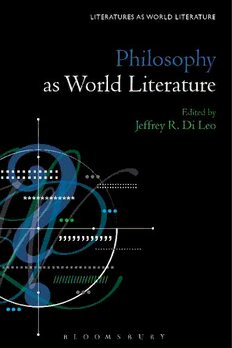
Philosophy as World Literature PDF
307 Pages·2020·6.721 MB·English
Most books are stored in the elastic cloud where traffic is expensive. For this reason, we have a limit on daily download.
Preview Philosophy as World Literature
Description:
What does it mean for philosophy to be considered as a species of not just literature but world literature? The essays in this collection offer a complex and authoritative account of philosophy as world literature by exploring philosophy through the lens of the “worlding” of literature--that is, considering the ways in which philosophy is connected and reconnected through global literary networks that cross borders, mix stories, and speak in translation and dialect.Historically speaking, much of the most influential philosophy in the world, from Plato’s dialogues and Augustine’s confessions to Nietzsche’s aphorisms and Sartre’s plays, was a form of literature--as well as, by extension, a form of world literature. The story of philosophy back to its beginnings has always involved transnational considerations, even if the Anglo-American analytic movement in philosophy appeared to push it in the opposite direction. hilosophy as World Literature offers a variety of accounts of the ways in which the worlding of literature problematizes the national categorizing of philosophy and brings new meanings and challenges to the traditional topic of intersections between philosophy and literature.
See more
The list of books you might like
Most books are stored in the elastic cloud where traffic is expensive. For this reason, we have a limit on daily download.
